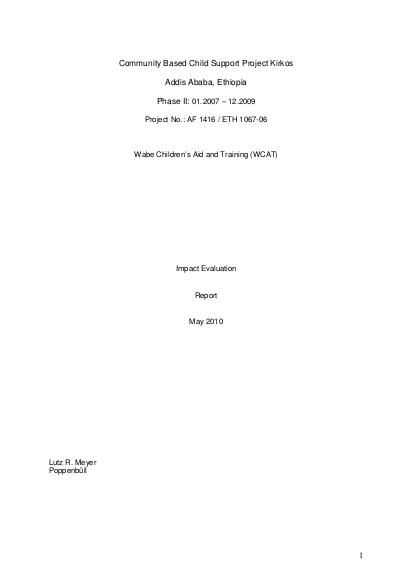
Addis Ababa represents poverty and social challenges of the entire Ethiopia, ranking among the poorest in the world (HDI 2009: 171 of 182; Welthungerhilfe-Index: 30.8). The sub-city of Kirkos is one of the focal areas with lowest living standards, high unemployment, extremely poor housing and sanitary conditions and a high HIV/AIDS rate. The related huge number of orphans, semi-orphans and other destitute children and youth are in need of protection, support, orientation and a perspective for their future. The project aims at improving the socioeconomic living conditions to provide the basis for a self-reliant life, and to individually support the children in school attendance, education and training. The project pays a monthly amount to guardian households, provides school uniforms and other items to the students as well as vocational training courses for youth, and it organises saving & credit groups for the guardian household members.
Kirkos is one of ten sub-cities of Addis Ababa, comprising about 14.7 km² and featuring large slum areas. The total population of Kirkos stands officially at about 335,000. The project area is only one part of Kirkos with about 5,500 households and a total of 22,000 inhabitants.
People living in the project area are having different ethical and religious backgrounds. Many of them are migrants. HIV/AIDS is a prevalent problem. The major source of income for the inhabitants of Kirkos is petty trade within the sub-city and daily (unskilled) labour here and anywhere in the capital. As a consequence, the majority of the households in Kirkos are by all means poor. The city government actually is planning a major restructuring of the Kirkos area, including the construction of major roads and multi-storey buildings.
Resource collections
- Evaluating humanitarian action
- Monitoring and Evaluation (M&E)
- Monitoring of humanitarian action
- UN Habitat - Urban Response Collection
- Urban Response - Urban Crisis Preparedness and Risk Reduction
- Urban Response Collection - Community Engagement and Social Cohesion
- Urban Response Collection - Economic Recovery
- Urban Response Collection - Environment and Climate Change
- Urban Response Collection - Housing, Land and Property
- Urban Response Collection - Urban Crisis Response, Recovery and Reconstruction
- Urban Response Collection - Urban Resilience
- Use of evaluation evidence